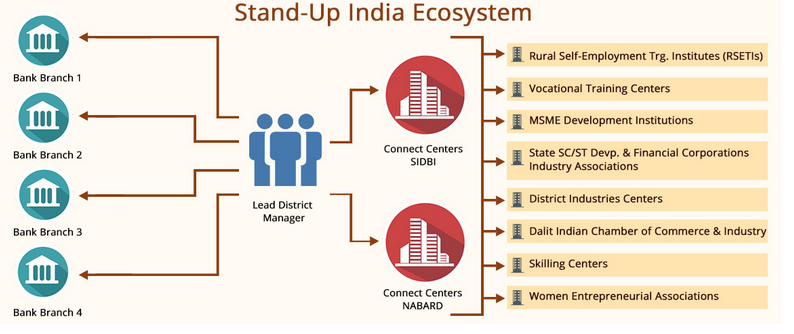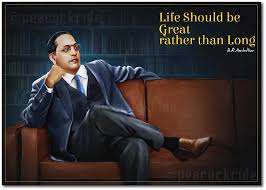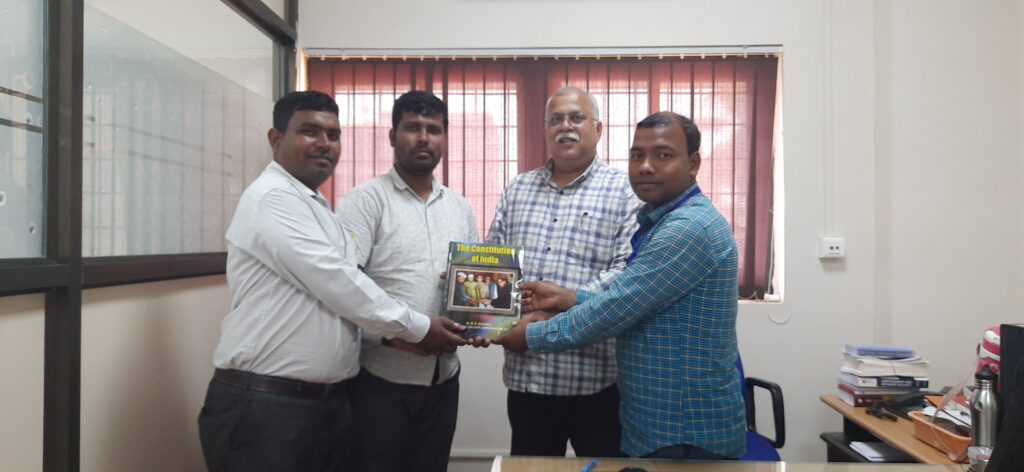![]()
Educate, Organise, Agitate
![]()
Dr. B. R. Ambedkar (popularly known as Babasaheb) has given this clarion call (slogan) to his followers because he believed that caste-based marginalisation had led millions of Dalits into abject mental and physical poverty, and stripped them of their humanity. The three pillars of the clarion call will guide the way towards emancipation, freedom, justice, equality, fraternity and liberty as guaranteed by the Indian Constitution.
His call has three components and let us understand each one:
- Educate – This emphasizes the importance of acquiring and spreading of knowledge and awareness. It involves educating self and individuals about social issues, injustices, and the need for change. Education is seen as a powerful tool to enlighten people, fostering understanding and critical thinking.
- Organise – Organizing involves bringing people together, forming groups/associations/societies/trusts/etc. for developing collective wisdom, establishing movements to collectively address issues and work towards a common goal.
- Agitate – Agitation refers to actively and passionately and in compliance to the law of land, advocating for change. Agitation is the action phase of the strategy, where individuals actively push (by all legal means available at their disposal) for the implementation of the desired changes.
Stand-up India
![]()

Stand-up India Scheme facilitates bank loans between Rs.10 Lakh and Rs.1 Crore to at least one Scheduled Caste (SC) or Scheduled Tribe (ST) borrower and at least one woman borrower per bank branch for setting up a greenfield enterprise. This enterprise may be in manufacturing, services, agri-allied activities or the trading sector. In case of non-individual enterprises at least 51% of the shareholding and controlling stake should be held by either an SC/ST or woman entrepreneur.
SC-ST Hub
![]()
The National SC-ST Hub has been set up to provide professional support to Scheduled Caste and Scheduled Tribe Entrepreneurs to fulfil the obligations under the Central Government Public Procurement Policy for Micro and Smal Enterprises Order 2012, adopt applicable business practices and leverage the Stand Up India Initiative. The Hub was launched on October 18, 2016.
The Hub is being implemented by the National Small Industries Corporation (NSIC), a public sector undertaking under the administrative control of the Ministry of MSME.
The Hub supports existing SC/ST entrepreneurs and enterprises in technological upgradation and capacity building thereby enabling them to effectively participate in government procurement process. This would involve active participation by CPSEs/Central Ministries, States, Industy Associations such as DICCI and others. Selected entrepreneurs would be provided with support and mentoring by industry experts, CPSEs & Incubators
The main action points include:
- To encourage SC/ST owned units to achieve their share of at least 4% of total procurement being made by Central/State Governments, CPSEs and other government agencies
- To prepare strategy for intervention through industry associations to sensitize, encourage and enable the SC/ST owned units for participation in Public Procurement Process
- Collection, collation and dissemination of information regarding SC/ST enterprises and entrepreneurs
- Facilitating SC/ST Entrepreneurs to be part of vendor development programs and mentoring support by specific CPSE matching the products/services of such entrepreneurs
- Facilitating SC/ST Entrepreneurs’ participation in Public Procurement through the e-platform of DGS&D and monitoring the progress
CoOp Introduction
![]()

CoOp is a software for supporting welfare Associations, Societies, Co-operative Societies, Trade Unions, Non-Government Organizations (NGOs), etc. in providing a platform to its members for collaboration, information sharing, etc.
Currently the following modules are available:
- Manager Module
- Member Module
- Guest Module
With the help of this software, the organization can:
- Maintain records of the members.
- Disseminate information by means of Articles.
- Inform its members about the Events being conducted in future.
- Etc.
The software can be downloaded from the following link.
| Release Date | File Link |
| 28-10-2024 | https://parivrajaka.in/coop-2024-10-28.war |
| 18-08-2024 | https://parivrajaka.in/coop-2024-08-18.war |
| 11-08-2024 | https://parivrajaka.in/coop-2024-08-11.war |
| 14-07-2024 | https://parivrajaka.in/coop-2024-07-14.war |
| 30-06-2024 | https://parivrajaka.in/coop-2024-06-30.war |
| 10-06-2024 | https://parivrajaka.in/coop-2024-06-10.war |
The following are the prerequisites for successful deployment of the software.
| Java 17 | https://openjdk.org/projects/jdk/17/ |
| Postgresql 15 | https://www.postgresql.org/ |
| Apache Tomcat 10 | https://tomcat.apache.org/download-10.cgi |
Installation Procedure
Install OpenJDK
sudo apt-get install openjdk-17-jdk
To check and confirm, that Java has been installed successfully see its version …
java –version
To install Apache Tomcat 10
sudo apt-get install tomcat10
To check and confirm, that Tomcat 10 has been installed correctly open the link http://localhost:8080 in the browser, or else run the following command
sudo systemctl status tomcat10
To install PostgreSQL
sudo apt-get install postgresql postgresql-contrib
To check and confirm, that PostgreSQL has been installed correctly run the following commend
sudo systemctl status postgresql
To enable PostgreSQL to start on boot, use the following command
sudo systemctl enable postgresql
By default, PostgreSQL creates a user named postgres with full administrative access to the entire PostgreSQL instance. For security purposes, it is recommended to set a password for this user. Switch to the ‘postgres’ user and access the PostgreSQL prompt:
sudo -i -u postgres
psql
postgres=# \password postgres
Enter new password and confirm it to set.
Now create the database coop
postgres=# create database coop
To quit from PostgreSQL prompt, use the following command:
postgres=# \q
To exit from postgres shell, use the following command:
exit
To download latest distribution of CoOp application, visit the link https://parivrajaka.in/category/coop/
Copy the downloaded application to webapps directory of Tomcat installation, by using the following command:
sudo cp ./Downloads/coop-2024-07-14.war /var/lib/tomcat10/webapps/coop.war
Now stop the tomcat10 service
sudo systemctl stop tomcat10
Edit the application.properties file for database properties
sudo nano /var/lib/tomat10/webapps/coop/WEB-INF/classes/application.properties
Modify the following lines as shown below:
spring.datasource.username=postgres
spring.datasource.password=abc123
Start the tomcat service again, by using the command below:
sudo systemctl start tomcat10
Using the link http://localhost:8080/coop, check and confirm that the application is installed correctly.
Use the following credentials to Sign-In for the first time.
User Id : admin
Password : admin
133rd Birth Anniversary of Dr. B. R. Ambedkar
![]()

Today (i.e. on 14th April, 2024), the entire world is celebrating the 133rd Birth Anniversary of Bharat Ratna Babasaheb Dr. B. R. Ambedkar. Life of Dr. Ambedkar teaches us to remain determined and true in our efforts in pursuit of our aims and objects. Parivrajaka Foundation wishes everyone a very happy birth anniversary.
Special Cells for SC / ST in Universities
![]()
Xth Plan profile of Higher Education in India under Para 10.B2 states as under:
“To ensure the effective implementation of the reservation policy in admission, recruitment, allotment of staff quarters, Hostels etc., SC/ST Cells are established in the Universities”.
The Commission is providing financial assistance to the Universities for the establishment of Special Cell for SC/STs.
Objectives
- To implement the reservation policy for SCs/STs in the Universities and Colleges.
- To collect data regarding the implementation of the policies in respect of admissions, appointments to teaching and non-teaching positions in the universities, and in the affiliaing colleges and analyse the data showing the trends and changes towards fulfilling the required quota.
- To take such follow up measures for achieving the objectives and targets laid down for the purpose by the Government of India and the UGC.
- To implement, monitor and evaluate continuously the reservation policy in universities and colleges and plan measures for ensuring effective implementation of the policy and programe of the Government of India.
Functions of the Special Cells
- To circulate Government of India and Commission’s decisions and to collect regularly, on an annual basis, information regarding course-wise admissions to candidates belonging to the Scheduled Castes and Scheduled Tribes in the Universities and Colleges for different courses, in forms prescribed, by a stipulated date, and to take follow up action, where required.
- To circulate Government of India orders and Commission’s decisions and to collect information in respect of appointment, training of these communities in teaching and non-teaching posts in the Universities and Colleges, in suitable forms by a stipulated date and take follow up action where required.
- To collect reports and information regarding the Government of India orders on the various aspects of education, training and employment of Scheduled Castes and Scheduled Tribes candidates, for evolving new policies or modifying existing policy of the Commission.
- To analyze the information collected above and prepare reports and digests for onward transmission to the Ministry of Human Resource Development/University Grants Commission and such other authorities as may be required.
- To deal with representations received from Scheduled Castes and Scheduled Tribes candidates regarding their admission, recruitment, promotion and other similar matters in Universities/Colleges.
- To monitor the working of the remedial coaching scheme, if approved in the affiliated colleges and university.
- To function as a Grievances Redressal Cell for the Grievances of SC/ST students and employees of the university and render them necessary help in solving their academic as well as administrative problems.
- To maintain a register for employment of SCs / STs in the University and Colleges for the candidates belonging to SC/ST communities for various posts in the university/colleges.
- Any other work assigned from time to time to promote higher education among these two communities suffering economic, social and education deprivations.
- The SC/ST Cell exclusively looks after the work related to SC/STs matters and no other work is assigned to the Cell.
- If the required data is not submitted by the given date, UGC reserves the right to withhold either plan or non-plan grant until the required information/data is received. Hence, the universities/colleges are advised to supply the necessary information as required.
Eligibility / Target Group
Financial assistance under the Scheme would be available to such Universities and Deemed Universities, which come within the purview of Section 2(f) and are fit to receive central assistance under section 12(B) of the UGC Act, 1956. The Scheme is meant for SC/ST only.
Nature of Financial Assistance Available Under the Scheme
- For Setting up of New SC/ST Cells
- For continuation of the Special Cells in the Xth Plan period for the Cells, which were established upto the end of IX Plan period.
Procedure for Applying for the Scheme
The Commission will invite proposals from Institutions in the beginning of the Plan as per the prescribed proforma (Annexure-I).
Procedure for Approval By the UGC
The proposal received from Universities and Deemed to be Universities will be scrutinized with the help of the Committee constituted for the purpose.
Procedure for Release of Grants by UGC
The Commission will communicate approval for setting up SC/ST Cells to the university and first instalment of Non-Recurring Grant will be released in respect of staff salary and contingency. The grants for the second year and subsequent years will be released only on the receipt of statement of expenditure (Annexure-IV) and utilization certificate (Annexure-V) along with the report of work undertaken for the grant paid during the last year. Audited statement of expenditure may be sent immediately after the audit is completed.
Fo claiming grant from the UGC for salary of the staff against the posts sanctioned for the scheme, the University should submit the following information to the UGC immediately after making the appointments:
- State Govt.’s or university’s own assurance to bear the liability towards the salary of the said post after the Commission’s assistance ceases.
- Name of the person appointed.
- Academic qualifications and experience.
- Post held by the incumbent prior to his/her appointment againts the said post and the name of the Institution where he/she was working.
- Date of joining the new post.
- Minutes of the Selection Committee.
- Details of the monthly pay offered including allowances in the scale of pay.
- Amount payable up to the end of the financial year.
- Number of increment, if any, to be given.
- Whether action been taken to fill the resultant vacancy, in case the person appointed belongs to the same university.
- A certificare to the effect that the appointment has been made in accordance with the procedure and norms prescribed as per University Rules (Annexure-VI).
Procedure for Monitoring the Progress of the Scheme
At the end of each academic year, the Coordinator / In-charge of the Special Cell, will submit an Appraisal report duly countersigned by the Liaison Officer through the Registrar, to the UGC, indicating a consolidated statement of the data, the progress achieved and the problems faced by the Cell. The action-taken by the Cell to implement the policy should be highlighted. The report on implementation of the reservation policy in the university should incdicate the percentage in admissions, appointments in teching and non-teaching staff, allotment of staff quarters, rooms in hostels, etc., together with the analysis of the report.
Advisory Committee at University Level
For effective implementation of policies and programmes of the reservation policy for the Scheduled Castes and Scheduled Tribes, University should appoint a liaison officer in the rank of Professor under whom the Cell may be placed, and a Standing Committee, with the Vice-Chancellor as a Chairman. The Committee will consist of Liaison Officer, 2 to 3 Heads of Departments, 2 to 3 faculty members (Professor, Reader and Lecturer level), 3 to 4 Principals of the under-graduate/post-graduate collge affiliated to the University and Co-ordinator of the SC/ST as a Member Secretary. Some of these members should belong to SC/ST categories. The Committee should meet twice a year to review the position and to solve the problems. The work relating to the implementation of the reservation policy may be monitored by the above stated Committee.
The Commission has constituted Standing Committee on SC/ST to over-see the implmementation of reservation policy in Universities and Deemed Universities. The Standing Committee on SC/ST will visit Universities to review and monitor the work of SC/ST Cells.
Let’s study The Constitution of India
![]()
Shri Sanjay Singh, Director, Parivrajaka Foundation flagged a mission to invite citizens of India to study the Constitution of India by donating a book to Shri Kumud Bagh in the presence of Shri Sambray Tudu and Shri Rajaram Ingle on 16.05.2023.

The Constitution is the fundamental law of a nation that outlines the powers and limitations of the government, and the rights and duties of citizens. It is an essential document that sets the framework for the governance of a country, and serves as a safeguard against the tyranny and abuse of power.
The knowledge of the Constitution of India will make every citizen aware of his rights and duties. It will allow him to identify opportunities to improve living standard of self and society.
In this mission, the following steps are to be followed:
- Purchase and study book (from any publisher of your choice) on the Constitution of India.
- After reading donate this to book to another individual from society, family or friends with a condition that he should read the book within 20-30 days. If he finds it worth retaining, he can keep it in his personal collection and buy another copy and return. If not, he can return the same copy back.
- After receiving the copy, the same shall be donated to another person.
This will form a chain and more and more people will read the book. Also invite people to keep this book along with other religious texts. Religious texts are for spiritual growth, so this book is for material and physical growth.
Key provisions of Policy of Reservation for SCs, STs and OBCs
![]()
Key provisions of Policy of Reservation for SCs, STs and OBCs:
1) SCs/STs get reservation in all groups of posts under the Government in case of direct recruitment and in case of promotions made by non-selection method. In case of promotions made by selection, reservation is available to them when promotions are made in Group B, C, D posts and from Group B to the lowest rung in Group ‘A’ posts.
2) SC/ST/OBC candidates appointed by direct recruitment and SC/ST candidates also promoted on their own merit are adjusted against reserved posts.
3) In promotion by selection to posts within Group ‘A’ which carry an ultimate salary of Rs.18,300.00 or less (pre-revised), there is no reservation, but the Scheduled Caste / Scheduled Tribe officers who are senior enough in the zone of consideration for promotion so as to be within the number of vacancies for which the select list is to be drawn up, would be included in that list provided they are not considered unfit for promotion.
4) There is general ban on de-reservation of posts in case of direct recruitment.
5) In case of direct recruitment various relaxations, like relaxations in age limit by 5 years; exemption from payment of examination / application fees; relaxation in qualification of experience at the discretion of UPSC/competent authority; relaxation in standard of suitability, etc. Are available to members of SCs and STs.
6) In case of promotion, zone of consideration is extended up-to five times the number of vacancies in case suitable candidates are not available within normal zone of consideration; minimum qualifying marks / standards of evaluation are relaxable; upper age limit is relaxable by five years where upper age limit for promotion is prescribed not more than 50 years.
7) There is a provision of appointment of liaison officers in all Ministries / Departments to ensure proper implementation of reservation policy.
Own merit candidate
A candidate belonging to SC/ST/OBC who is selected on the same standard as applied to general category candidates and who appears in the general merit list is treated as own merit candidate. Such candidate is adjusted against unreserved point of the reservation roster. Department of Personnel and Training O.M. No. 36011/1/98-Estt.(Res.) dated 1-7-1998 clarifies that only such SC/ST/OBC candidates who are selected on the same standard as applied to general candidates shall not be adjusted against reserved vacancies. In other words, when a relaxed standard is applied in selecting an SC/ST/OBC candidate, for example in the age limit, experience qualification, permitted number of chances in written examination, extended zone of consideration larger than what is provided for general category candidates, etc., the SC/ST/OBC candidates are to be counted against reserved vacancies. Such candidates would be deemed to be unavailable for consideration against unreserved vacancies.
Guidelines in case of migration of a reserved category person from one State to another State
When a person migrates from one portion of the State in respect of which his community is Scheduled to another part of the same State in respect of which his community is not scheduled, he will continue to be a member of the Scheduled Caste or the Scheduled Tribe or the Backward Class, as the case may be in relation to that State.
When a person who is a member of one State moves to another, he can claim to belong to a Scheduled Caste or a Scheduled Tribe only in relation to the State to which he originally belonged and not in respect of the State to which he has migrated.
Objective behind the issuance of caste certificates to Scheduled Castes and Scheduled Tribes
The main objective of issuance of caste certificate is to facilitate access of bonafide candidates belonging to the Scheduled Castes, Scheduled Tribes and Other Backward Class to the reserved posts and services under the State and other facilities provided by the State to them.
Guidelines in regard to scrutiny and verification of caste certificates in Government Service
The Government of India has issued instructions regarding scrutiny and verification of the caste certificates of the candidates at the time of initial appointment and at every important upturn of employee’s career. This Department re-iterated the instructions vide O.M. No.36011/3/2005-Estt. (Res.) dated 9th September 2005.
Saathi Portal
![]()
Saathi Portal of Parivrajaka Foundation is for encouraging collaboration and mutual support amongst the community members of Parivrajaka Foundation. It is planned to bring following aspects for mutual exchange:
- General / Expert Services
- Directory of Professionals / Businesses
- Listing of Employment Opportunities
- Listing of Matrimonials
The membership of Saathi Portal is based on invitation only. In case you feel that you belong to the community, please drop an email to parivrajaka.foundation@outlook.com for invitation.
